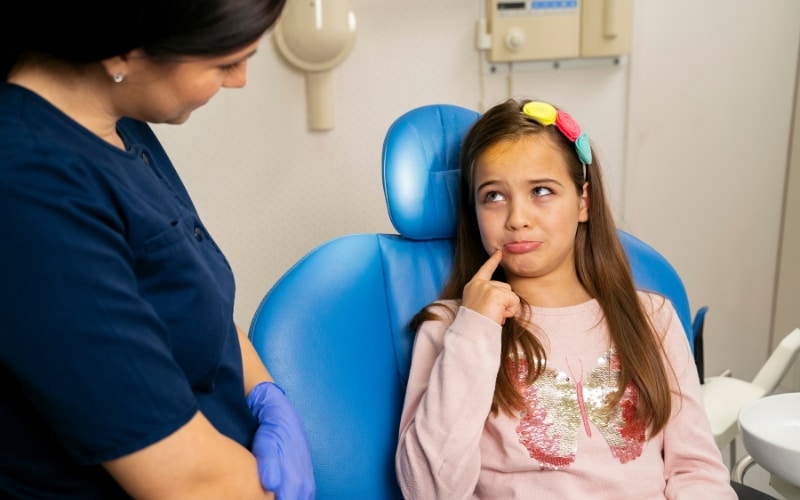ONLINE SCHEDULING AND VIRTUAL CONSULTS AVAILABLE

How Do Pediatric Dentists Fight Tooth Decay?

Keeping those tiny teeth healthy isn’t always easy! Between juice boxes, forgotten brushing sessions, and the allure of all things sweet, childhood can be a battlefield for little smiles. Tooth decay, often referred to as cavities, is a common enemy that can wreak havoc on those pearly whites. But fear not, brave parents! In this blog, we’ll explore the world of pediatric dentistry, where skilled professionals act as superheroes, wielding the latest tools and techniques to fight tooth decay and keep your child’s smile bright and healthy.
Just like superheroes have special powers, a pediatric dentist Weston, FL, possesses the knowledge and tools to fight tooth decay in children. They create fun and friendly offices to chase away fear, and their dental arsenals hold weapons like fluoride and sealants to keep those pesky trolls at bay. Read on to understand tooth decay, how these dental defenders fight it, and how you can join the mission to protect your child’s smile!
Who Are Pediatric Dentists?
Unlike your regular dentist, pediatric dentists are professionals with extra training specifically focused on the unique needs of children’s oral health. After completing dental school, they dedicate an additional two to three years to a residency program in pediatric dentistry. This rigorous training equips them with a deep understanding of child development, behavior management techniques, and the specific dental challenges children face at different stages of growth.
A Fortress of Fun
Imagine a dentist’s office that feels more like a wonderland than a waiting room! Pediatric dentists understand that a trip to the dentist can be daunting for young patients. That’s why they create offices filled with vibrant colors, playful decorations, and comfortable furniture. Many even have televisions playing kid-friendly shows or video games to distract little ones and create a positive experience.
Tools for Tiny Teeth
Just like any superhero, pediatric dentists have a special arsenal of tools to fight tooth decay. They use smaller, child-sized instruments that are more comfortable for little mouths. For cavity detection, they might utilize specialized digital X-rays that take minimal time and minimize discomfort. Additionally, they have access to tools like fluoride varnish and dental sealants, which act as shields to protect teeth from decay.
Understanding Tooth Decay in Children
Tooth decay, also known as cavities, is a common childhood concern. But what exactly causes those pesky holes in little smiles? The culprit is a battle between sugar bugs (bacteria) and our teeth’s natural defenses. When sugary foods and drinks linger in the mouth, these sugar bugs produce acid. This acid breaks down tooth enamel, the hard outer layer of our teeth, creating tiny cavities.
Causes and Risk Factors of Tooth Decay
Here are some risk factors that can increase a child’s chance of developing tooth decay:
- Frequent Snacking: Constantly munching on sugary treats allows sugar bugs more opportunities to feast and produce acid.
- Sipping on Sugary Drinks: Juices, sodas, and even sports drinks contain high amounts of sugar that can bathe teeth in acid for extended periods.
- Poor Brushing and Flossing Habits: Brushing twice a day and flossing once a day removes food particles and plaque, the sticky film where sugar bugs love to hide. Without proper cleaning, plaque hardens into tartar, which can trap bacteria and accelerate decay.
- Pacifier or Bottle Use with Sweetened Liquids: Leaving a child to sleep with a bottle filled with juice, milk, or formula allows sugary liquids to pool around teeth for extended periods, increasing the risk of decay.
- Dry Mouth: Saliva naturally washes away food particles and helps neutralize acid produced by bacteria. Certain medications or medical conditions can cause dry mouth, increasing the risk of cavities.
Impact of Untreated Tooth Decay on Oral Health
Leaving cavities untreated can lead to a domino effect of problems for your child’s oral health. Here’s why early detection and treatment are crucial:
- Pain and Sensitivity: As cavities grow deeper, they can irritate the tooth’s inner nerves, causing toothaches and sensitivity to hot or cold foods.
- Difficulty Eating: Painful cavities can make chewing uncomfortable, leading to difficulties with eating and proper nutrition.
- Infection and Swelling: Untreated cavities can become infected, causing swelling in the gums and face and potentially requiring more extensive treatment.
- Tooth Loss: Severely damaged teeth may need extraction, which can affect speech, chewing, and self-confidence.
Role of Pediatric Dentists in Preventing Tooth Decay
Just like knights with shining armor, pediatric dentists stand guard against the threat of tooth decay. Their role extends far beyond simply filling cavities. Here’s how these dental superheroes work tirelessly to keep your child’s smile healthy and bright:
Early Detection and Diagnosis of Dental Issues
Regular dental checkups with a pediatric dentist near Weston, FL are the cornerstone of cavity prevention. These checkups allow for early detection of cavities and other potential problems. Pediatric dentists use a variety of tools and techniques for this purpose, including:
- Visual Examination: They closely examine your child’s teeth, gums, and bite for any signs of decay, gum disease, or misalignment.
- Digital X-rays: These low-dose X-rays provide a clear view of hidden cavities between teeth or below the gum line.
- Oral Hygiene Assessment: They evaluate your child’s brushing and flossing habits and offer guidance on improvement.
Education on Proper Oral Hygiene Habits
Empowering parents and children with knowledge is a crucial part of a pediatric dentist’s strategy. They provide age-appropriate education on:
- Brushing Techniques: They demonstrate the proper way to brush teeth for children of different ages, ensuring they reach all surfaces effectively.
- Flossing: They teach children the importance of flossing and demonstrate proper flossing techniques to remove plaque from between teeth.
- Healthy Diet Choices: They discuss the link between sugary foods and drinks and tooth decay and offer tips on promoting a healthy diet for strong teeth.
Application of Preventive Treatments Like Dental Sealants and Fluoride Varnish
Pediatric dentists have powerful tools in their arsenal to prevent cavities before they even start. These include:
Dental Sealants
These thin, protective coatings are painted on the chewing surfaces of molars and premolars, creating a barrier against decay-causing bacteria and food particles.
Fluoride Varnish
This concentrated topical fluoride treatment strengthens tooth enamel and can even reverse the early stages of tooth decay.
Innovative Approaches to Fighting Tooth Decay
Pediatric dentistry is constantly evolving, embracing new technologies and techniques to make the fight against tooth decay even more effective. Here are some innovative approaches that pediatric dentists are utilizing:
Utilization of Digital Technologies for Patient Education: Gone are the days of static dental charts! Many pediatric dentists now use interactive apps, games, and animations to educate children about oral hygiene in a fun and engaging way. These tools can visually demonstrate the importance of brushing and flossing while also making the learning process more enjoyable for young patients.
Behavioral Management Techniques for Anxious Children: A visit to the dentist can be a nerve-wracking experience for some children. Pediatric dentists are skilled in using various behavioral management techniques to put young patients at ease. This might include using tell-show-do techniques to explain procedures beforehand, and offering nitrous oxide (“laughing gas”) to reduce anxiety. Also, this might include even incorporating positive reinforcement strategies like sticker charts.
Collaboration with Parents to Promote Oral Health at Home: Pediatric dentists understand that a child’s oral health journey doesn’t end at the dental office. They actively partner with parents by providing personalized guidance and resources on maintaining good oral hygiene habits at home. This can include creating a customized brushing routine and offering tips for addressing common challenges like thumb-sucking or pacifier use. By working together, parents and pediatric dentists can ensure a lifetime of healthy smiles for their children.
Keeping your child’s smile healthy doesn’t have to be a battle! A pediatric dentist Weston, FL are your partners in this adventure, equipped with the knowledge, and friendly approach to empower you and your child. Schedule your child’s next checkup today, and embark on a journey of healthy smiles together!




